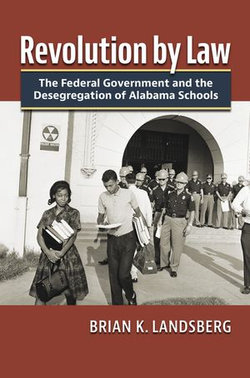The landmark Brown v. Board of Education case was the start of a long period of desegregation, but Brown did not give a roadmap for how to achieve this lofty goal—it only provided the destination. In the years that followed, the path toward the fulfillment of this vision for school integration was worked out in the courts through the efforts of the NAACP Legal Defense organization and the Civil Rights Division of the US Department of Justice. One of the major cases on this path was Lee v. Macon County Board of Education (1967).
Revolution by Law traces the growth of Lee v. Macon County from a case to desegregate a single school district in rural Alabama to a decision that paved the way for ending state-imposed racial segregation of the schools in the Deep South. Author Brian Landsberg began his career as a young attorney working for the Civil Rights Division of the DOJ in 1964, the year after the lawsuit that would lead to the Lee decision was filed.
As someone personally involved in the legal struggle for civil rights, Landsberg writes with first-hand knowledge of the case. His carefully researched study of this important case argues that private plaintiffs, the executive branch, the federal courts, and eventually Congress each played important roles in transforming the South from the most segregated to the least segregated region of the United States. The Lee case played a central role in dismantling Alabama's official racial caste system, and the decision became the model both for other statewide school desegregation cases and for cases challenging conditions in prisons and institutions for mentally ill people. Revolution by Law gives readers a deep understanding of the methods used by the federal government to desegregate the schools of the Deep South.



Share This eBook: